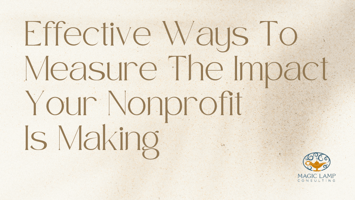One of the most important aspects of any nonprofit organization is its ability to measure its...
Effective Ways to Measure Nonprofit Impact

The term “impact” can be difficult to define, particularly for nonprofits that often operate in areas that are hard to quantify. However, measuring impact is important in order to track progress and ensure that resources are being used effectively.
There are a variety of ways to measure impact, and the method(s) used will depend on the specific goals and objectives of the organization. Some common methods include surveys, interviews, focus groups, observation, and data analysis.
No matter which method(s) you choose, it is important to make sure that the data you collect is reliable and valid. This means ensuring that your methodology is sound and that you have a good sample size. Additionally, you will need to make sure that you are collecting data on the right indicators. Once you have collected your data, it is crucial to analyze it carefully. This will help you to identify any trends and make sure that you are achieving your desired impact.
Some effective ways you can measure your nonprofit's impact are:
Output of Programs
This is the most basic level of measurement and simply involves tracking the number of programs or services delivered by the organization to your targeted population. For example, a soup kitchen might track the number of meals served, while a literacy program might track the number of people who complete the program. The more data you can collect, the better!
Outcomes of Programs
This approach goes one step further than outputs and seeks to measure the changes that have occurred as a result of the programs or services delivered. For example, a food pantry might track the number of people who report having enough to eat after receiving their weekly food distribution, while a career development program might track the number of people who gained employment after completing the program.
Long-Term Results
This is the most holistic approach to measuring impact and seeks to measure the long-term changes that have occurred as a direct result of the organization’s work. For example, a soup kitchen might track the number of people who are able to break out of the cycle of poverty after receiving meals, while a literacy program might track the number of people who are able to gain employment and achieve financial stability after completing the program.
Internal Growth
Another way to measure impact is by looking at how your organization has changed over time. This could include changes in funding, staffing, programs, or reach. For instance, if your organization has doubled its budget over the past five years, that would be an indication of increased impact and growth in the right direction.
Staying consistent with tracking and analyzing the data will help your nonprofit not only run a more sustainable organization but it will be well prepared when it is time to seek funding. Many funders require nonprofits to report on their impact in order to begin or continue to receive support. Measuring the impact can help build credibility and legitimacy both with the public and with potential funders. Your organization is making a huge impact in your community - show them with the data!
Let Us Help You
Have questions about how you can begin measuring the impact at your organization? We encourage you to connect with us or learn more about our On-Demand Strategy Consulting service which focuses on building your nonprofit's foundation to prepare you for success.
There are a variety of ways to measure impact, and the method(s) used will depend on the specific goals and objectives of the organization. Some common methods include surveys, interviews, focus groups, observation, and data analysis.
No matter which method(s) you choose, it is important to make sure that the data you collect is reliable and valid. This means ensuring that your methodology is sound and that you have a good sample size. Additionally, you will need to make sure that you are collecting data on the right indicators. Once you have collected your data, it is crucial to analyze it carefully. This will help you to identify any trends and make sure that you are achieving your desired impact.
Some effective ways you can measure your nonprofit's impact are:
Output of Programs
This is the most basic level of measurement and simply involves tracking the number of programs or services delivered by the organization to your targeted population. For example, a soup kitchen might track the number of meals served, while a literacy program might track the number of people who complete the program. The more data you can collect, the better!
Outcomes of Programs
This approach goes one step further than outputs and seeks to measure the changes that have occurred as a result of the programs or services delivered. For example, a food pantry might track the number of people who report having enough to eat after receiving their weekly food distribution, while a career development program might track the number of people who gained employment after completing the program.
Long-Term Results
This is the most holistic approach to measuring impact and seeks to measure the long-term changes that have occurred as a direct result of the organization’s work. For example, a soup kitchen might track the number of people who are able to break out of the cycle of poverty after receiving meals, while a literacy program might track the number of people who are able to gain employment and achieve financial stability after completing the program.
Internal Growth
Another way to measure impact is by looking at how your organization has changed over time. This could include changes in funding, staffing, programs, or reach. For instance, if your organization has doubled its budget over the past five years, that would be an indication of increased impact and growth in the right direction.
Staying consistent with tracking and analyzing the data will help your nonprofit not only run a more sustainable organization but it will be well prepared when it is time to seek funding. Many funders require nonprofits to report on their impact in order to begin or continue to receive support. Measuring the impact can help build credibility and legitimacy both with the public and with potential funders. Your organization is making a huge impact in your community - show them with the data!
Let Us Help You
Have questions about how you can begin measuring the impact at your organization? We encourage you to connect with us or learn more about our On-Demand Strategy Consulting service which focuses on building your nonprofit's foundation to prepare you for success.





